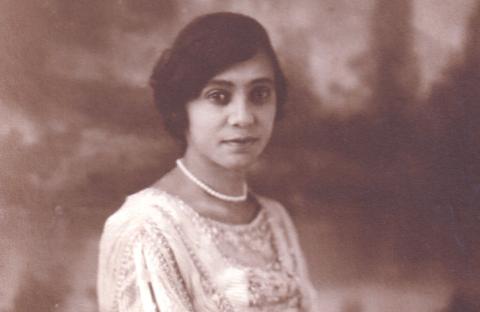Expanding the Historical Record

The history of music is told by a select few who decide what will make its way into textbooks and onto concert programs. As career musicians, we trust that this account is comprehensive. We progress through school, and then—in a state of postdoctoral shock—we run out of degrees and realize we were not provided with the whole story. Five years ago, while I was preparing for a tour meant to investigate the Quaker abolitionist history of Nantucket Island through an exploration of the African American spiritual, a student asked: “Dr. Spinelli, who are the Black women who contributed to our repertory?” Stunned and ashamed that I was only able to offer a few contemporary names, I realized I would need to become my own teacher.
A name kept appearing in my research: Florence B. Price. Price was the first Black woman composer to have a symphony premiered by a major American orchestra, and her prodigious career began at an early age. Shortly after graduating as the valedictorian of her high school class at the age of 14, she attended the New England Conservatory, where she graduated as the only double major in her class, earning a soloist’s diploma in organ and a pedagogy degree in piano. Her accomplishments continued to accumulate as she became chair of the department of music at Clark University and wrote the famous arrangement of “My Soul’s Been Anchored in the Lord” that was sung by Marian Anderson on the steps of the Lincoln Memorial in 1939. She shattered glass ceilings, defied racial barriers, and produced hundreds of compositions, many of which remain unpublished.
Somehow, through my three music degrees and four years serving on the faculty of Cornell University, I was just learning of her phenomenal legacy. These experiences led me—together with some amazing colleagues—to found ONEcomposer, a nonprofit dedicated to research, performance, and artist support with the goal of elevating historically excluded musical legacies. Price, her music, and her breathtaking legacy serve as a wormhole through which I continue to reckon with the idea of historical erasure.
This research will yield new editions of previously unpublished work, first-ever recordings, and community engagement and main-stage presentations with major arts organizations.
In my research, I learned of Price’s friend Margaret Bonds, a composer and pianist who was the first Black soloist to appear with the Chicago Symphony Orchestra. Shortly after Bonds’s death in 1972, Zubin Mehta and the Los Angeles Philharmonic played excerpts of her final major work, Credo. The parallel history of Black excellence in music is expansive, and archival research—through which we explore correspondence, manuscripts, and other priceless accounts of remarkable musical lives—is a passion of mine.
As a research fellow at Yale’s Beinecke Rare Book & Manuscript Library, I am presently immersed in all things Margaret Bonds: her extensive correspondence and collaborations with Langston Hughes and other leading creatives of the time, as well as photography, concert programs, and manuscripts. This research will yield new editions of previously unpublished work, first-ever recordings, and community engagement and main-stage presentations with major arts organizations such as Opera Philadelphia, the Mann Center, and—most certainly—Boston Conservatory, which has quickly become a passionate partner in this work.
On December 8, 2022, the Boston Conservatory chorus and orchestra presented the New England premiere of Florence Price’s Song of Hope. This work, for which she composed both the music and its text, was written while Price was fleeing the Jim Crow South as part of the Great Migration, only to enter the difficult economic landscape of the Great Depression. Her husband, having lost his job, became an abusive alcoholic, and Price bravely divorced him just a few years later. In the face of overwhelming societal and personal hardship, Song of Hope—expressing her faith that better times must lie ahead—poured from her pen. Also on the program were unpublished orchestrations of spirituals that Bonds wrote for the great Leontyne Price '19H, performed by guest artist and Metropolitan Opera superstar soprano Karen Slack.
Research-based performance brought to life through the hard work and talent of our very own student body contributes to a correction of the historical record and the recollection of incredible legacies that have been excluded for far too long.
This concert offers a vivid picture of how research impacts music education and manifests in performance programming at Boston Conservatory. Research-based performance brought to life through the hard work and talent of our very own student body contributes to a correction of the historical record and the recollection of incredible legacies that have been excluded for far too long.
By placing excluded excellence alongside well-documented legacies of musical excellence, it is my sincere hope that we will enable Boston Conservatory students to graduate with a fuller, richer sense of what the musical “canon” could be. Every Boston Conservatory student who participates in choral studies will experience the work of Price, Bonds, William Grant Still, Undine Smith Moore, and as many of the countless remarkable and historically excluded legacies as we can continue to rediscover and include. This work will surely prompt students to program, explore, and seek out erased histories, and herein lies the very hope that Price is summoning in her powerful Song of Hope. Even through the unthinkable circumstances Price faced, and despite the forces of systemic racism that exclude incredible Black legacies like hers, a life steeped in disciplined work, belief in humanity, and the creativity required of a life in music can produce change for the better that echoes through the decades.
“I have been really inspired by singing this work, while alternately feeling frustrated that it’s taken this long for Florence Price’s amazing artistry to be rightfully examined and celebrated. Her story is really reflected in this work, as the text is at times declamatory, at others prayerful and introspective, but ultimately triumphant. As much as we sing the works of composers from the standard repertoire, it’s so important to acknowledge that other people were creating works of beauty and reflecting sides of humanity that are not often represented.”
—Mandy Matthews, M.M. '24, vocal pedagogy
READ: STAGES 2022–2023

“Expanding the Historical Record" first appeared in the 2022–2023 issue of STAGES, Boston Conservatory's annual magazine.
